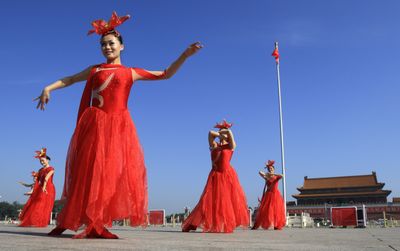Bush’s visit to Beijing a mix of politics, sports

WASHINGTON – President Bush is so emphatic about going to the Olympics in China that one might think flying halfway around the globe to attend the games is what presidents do.
But never before has an American leader shown up at an Olympics on foreign soil. And Bush is doing more than just dropping by. He is planning to soak in as much as he can, with large blocks on his Beijing schedule devoted to watching athletes compete.
For this president, perhaps the most avid in a long line of White House sports buffs, it is an event that begins and ends with sports.
Yet politics have intruded in Olympics past, from Cold War boycotts to terrorism, and host China is right at the intersection of debates over human rights, security and trade. Even the Olympic torch relay fell victim to protests in Europe and the U.S.
Bush, who sets out Monday on a weeklong Asia trip, touches down first in South Korea, where trade, North Korea’s nuclear program and the issue of U.S. beef imports will top the agenda. Then in Thailand, Bush will draw attention to the repressed citizens in neighboring Myanmar, also called Burma, and reflect on the future of U.S. policy in the Far East.
The heart of the trip is in Beijing, where Bush is to spend four nights and days.
He must remind the world of his oft-stated commitment to freedoms in China, a country his own State Department brands as an authoritarian abuser of the most basic human rights. Yet he wants to avoid showing up the host country, a partner of enormous value to the U.S.
“I’m confident that by showing respect to the people, to the Olympics, it will put me in a position to continue to have frank and candid discussions,” Bush told reporters this past week.
He means his talks with China’s president, Hu Jintao. Bush says they have become comfortable, candid and meaningful. In turn, he says he can push Hu privately about the need to expand individual freedoms, something he will do again on this trip. Bush will also attend a church service in Beijing and speak about the importance of religious freedom.
Bush says boycotting the opening ceremony of the games this Friday – an idea floated after China’s violent crackdown in Tibet – would be an affront to the Chinese people. He says more good comes from going and building respect and trust from the Chinese.
“This is an enormous show of face, gesture of face, from the president to actually go to the Olympics,” said Charles Freeman, a former U.S. trade official on China matters who is now with the Center for Strategic and International Studies. “This is China’s international coming-out party in many respects, the Olympics. So it’s an enormous thing.”
The risk, as human rights activists argue, is that Bush’s attendance legitimizes the Chinese government. Sophie Richardson, the Asia advocacy director for Human Rights Watch, said Bush should make time to be blunt and specific in public about abuses in China.
“If this man is going as the leader of the free world to one of the most notorious rights-abusing regimes in the world, and he spends the whole afternoon watching water polo, what does that say about where the United States’ priorities lie?” she asked.